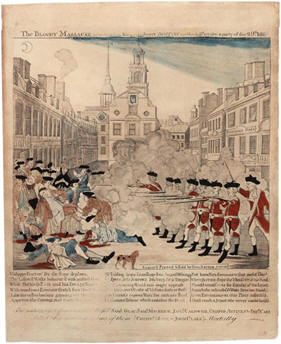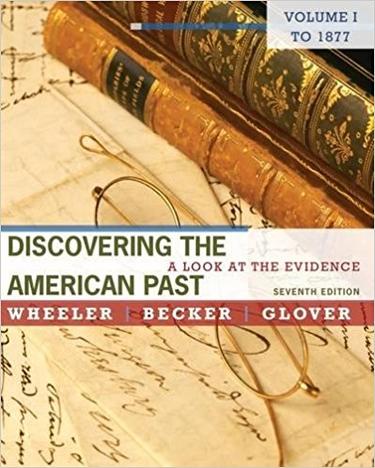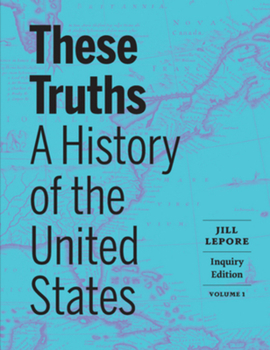U.S.
History I: ON-LINE COURSE
HIST 2211.50 (4 credits)
Anoka-Ramsey
Community College
Dr. Linda Janke
Summer 2025
|

|
Office Location: H227 -- Coon Rapids Campus
--
When am I available for students? On-line availability will be announced on D2L;
I am
available to
make an appointment for a phone call and/or a Zoom Meeting at a time that works
for both of us.
Please be in touch using your "Contact Linda" discussion group on
D2L.
 763-433-1284 763-433-1284
 linda.janke@anokaramsey.edu linda.janke@anokaramsey.edu
|

Janke’s homepage:
http://webs.anokaramsey.edu/janke
Class schedule of readings and assignments:
2211onlineschedulesummer.htm
|
|
Paul Revere, “The Bloody Massacre in King-Street, March 5, 1770.”
Boston, 1770. (Gilder Lehrman Collection) |
|
|
Dear students,
Welcome
to US History I!
I am excited to spend
the summer together learning about U.S. History. HIST 2211 covers a long
span of history from before European contact up through and immediately after
the Civil War, and my class places an emphasis on social and cultural history.
You do not need to have taken any U.S. History
before; this is a stand-alone class.
In addition to topical knowledge of U.S. history,
this course is designed to help you gain skills in reading comprehension,
critical-thinking, note-taking, and how to engage in thoughtful academic debates
and discussions.
While
I love to meet students in person, this summer my
student-contact hours (also known as "office hours") will be held over Zoom. I also frequently talk with students using a good
old-fashioned phone call. Feel free to reach out to schedule one.
I am always eager to talk with you about class topics or consult about issues
you might be having inside or outside of class. You should feel free to use your
individual discussion forum in the "Contact Linda" area of D2L.
If “life happens” events
prevent you from focusing on this class for any length of time,
please keep in touch with me
about it.
This course is a fully asynchronous on-line class which means
that there will be no scheduled events that everyone has to complete at the same
exact time. How you decided to structure your time so you can complete the
coursework is totally up to you. We will run on a weekly schedule with
deadlines on Mondays and Tuesdays at NOON, except for the last week which is a
bit shorter. Click here for a sample weekly
schedule.
I am confident you can be a successful
student in this class. The best way for you to
be an active participant in
your learning and our class discussion is to complete the assigned reading and
reach out to me and/or your classmates with questions and reactions.
Consult the on-line class schedule
(URL above) for the schedule of assigned readings.
You can also find a link to the course schedule in the Content menu on D2L.
I expect that
our virtual classroom will be a place where we all
value intellectual inquiry and mutual respect.
While I welcome a rigorous debate about history, I
will not tolerate students who do not respect others’ race, ethnicity, skin
color, religion, gender, immigration status, or sexual orientation.
I’m confident that starting from this framework of
mutual respect, curiosity about history, and a
willingness to focus on our time together will result in a successful semester.
Linda Janke
Materials You Will Read:
|

|
There are many assigned readings available for
free on the internet. If you’re confused
about which internet link to read for class,
ALWAYS start at the class schedule webpage.
Everything you need is there.
I *highly* suggest you print out these
readings if you can.
Printing
out readings helps you become an “active
reader,” which means you can take notes,
highlight, etc. as you read. You have free
printing on campus! Make some time to stop
by and print out everything you'll need for this
class.
|
|

|
Discovering the American Past: A Look at the
Evidence, Volume I: to 1877.
8th Edition, by William Wheeler and Lorri
Glover.
This book is our “course reader,” which
means each chapter contains primary source
documents about a particular topic in U.S.
History.
We will not read the entire book, but
selected chapters will be assigned.
In class we will discuss some strategies
for being an “active reader” of an electronic
book (printing selections, using their
note-taking interface, etc.)
Your course fee has already paid for this book!
It can be located in D2L >
Materials > Content under “VitalSource ebooks.”
If you would prefer to purchase a hard
copy instead, you may opt out of purchasing this
book, but you must act fast!
See Prof. Janke if you wish to opt out
because you’ll need to make sure you’re buying
the correct edition.
|
|

|
These Truths: A History of the United States Volume I,
by Jill
Lepore. This book will give you the "basics" of
U.S. history during this time period, but I
believe it reads more like a good story than a
traditional textbook. I hope you will
agree! We will read almost every chapter in this
book and you will complete Inquisitive units on
D2L.
Your course fee has already paid for this book!
It can be located in D2L >
Materials > Content under “VitalSource ebooks.”
If you would prefer to purchase a hard
copy instead, you may opt out of purchasing the
ebook, but you must act fast!
See Prof. Janke if you wish to opt out
because you’ll need to opt into the Inquisitive
units by making a separate purchase.
|
 |
Classic Slave Narratives, edited by
Henry Louis Gates, Jr. We will be reading
two narratives written by enslaved people.
These are freely available on-line, so you can
follow the links from the class schedule
webpage. If you would prefer to purchase a
hard copy of this book, it is for sale in the
campus bookstore. This book is a mass-market
paperback and it is
very inexpensive. You might be able to
find a cheaper copy via on-line retailers and/or
find a copy at your local public library.
Any edition is fine. I personally recommend having a hard copy of the
book you can flag and highlight, but it is
totally up to you. |
Assignments You'll Complete:

A=
90-100%, B= 80-89%, C= 70-79%, D=60-69%, and F=59% and below
Discussion Posts:
Discussion occurs on a weekly basis from Tuesday at NOON to the following
Tuesday at NOON, except for the last week of class, which is short and will
not have a Saturday deadline. You cannot go back and make up missed posts.
Late posts will not be counted. In order to earn a passing grade (C)
in discussion please meet all of the following requirements:
1. Read all posts made by your classmates
--
yes, this will be a lot of reading, but that is factored into
the overall course reading load.*Note you will need to make sure
your settings in D2L are configured correctly to reflect this.
Look for an announcement on D2L about it.
2. Post at least four times per week
3. Make at least two of those posts before Saturday evening
If you wish to earn a grade greater than C in discussion, you
must meet and exceed those requirements. I don't have an exact
equivalent of the number of posts you must make for each grade.
Evaluating discussion grades includes comparing each student to
his/her peers. It also includes evaluating the strength of a
student's work each week. You should aim to make several longer
and more substantive posts per week, closer to a paragraph in
length, and including specific examples or quotations from the
reading. A rough estimate would be that 6-7 posts per week
would fall in the B range, and 8+ posts per week would be in the
A range.
Click here for a chart
that describes which components contribute towards a strong discussion
grade.
How you make and distribute your posts is up to you. You can
reply to one or more of my questions, reply to a classmate, or
make up your own new post. Every post you make counts towards
your weekly total
How will you receive a grade
and feedback? I I will not be providing weekly feedback
on your discussions but I will give you a midterm grade for
discussion at that point in the summer and your final grade in discussion will
be an average of nine weeks of work (one week uncounted due to
the dropped week; see below). I am also happy to
give more frequent evaluations upon individual request -- just use your Contact
Linda forum to ask! Also, since I evaluate
your discussion posts more thoroughly after the discussion has ended, I may miss
something during the time that the discussion is actually occurring.
Please
alert me using Contact Linda about any concerns or questions that arise during each week of discussion.
What if you miss a week of Discussion? I will automatically drop
your "lowest" week in Discussion once during the summer. You
cannot go back and make up missed work in Discussion since the
goal of requiring weekly posts is to produce a back-and-forth
dynamic that helps you learn the course materials and feel
connected to your classmates. We cannot work together to grow a
classroom community if students are posting at different times
throughout the summer, so please make sure to stay involved in
the current week! Again, late work in Discussion is not counted,
so make sure to get your posts in before the Tuesday noon
deadline.
EXTRA CREDIT FOR YOUR DISCUSSION SCORE: There is an
ungraded Discussion Forum in D2L called "Class Cafe." I would
like to encourage you to stop by the Cafe and "chat" with your
classmates. In order to encourage folks to post in the Cafe,
you can earn up to TEN extra credit points to be added to your
discussion score at the end of the summer. How can you earn the extra
credit points? It's pretty easy! I will award points for the
posts you make, and will strongly encourage you to have at least
one post be a question for others to answer. The rest of your
posts can be replies to your classmates. If you make 10 posts
and are involved in the overall conversation, you will earn 10
points. If you make 10 posts but don't "stick around" to
participate in the conversation, your extra credit points will
be reduced. If you make all of your posts in the last week
of the class you won't earn the full 10 points, so aim to be
involved in the conversation throughout the summer.
Discussion Quizzes:
(biggest chunk of your course grade)
Discussion Quizzes are
available each week from Tuesday at NOON to the following Tuesday at NOON,
except for Week 10, which will be a short week ending Friday at NOON.
These are short-answer quizzes. The reading material that is "fair game"
for the quizzes is listed under the heading "Reading for Discussion and
Discussion Quizzes"
on the course schedule -- the material that is in the GREEN
column. This means that textbook (These Truths --
yellow column) will NOT be included in these quizzes. You are not permitted to
do outside research to answer quiz questions; rely only on course materials.
Do not expect to be able to Google your way to the correct answer. Copying
answers (see below) off the internet OR USING ARTIFICIAL INTELLIGENCE SUCH AS
CHAT GPT will result in earning a zero for the quiz,
possible referral to the Dean, and/or possibly failing the quiz portion of your
grade. Linda will more fully explain her AI policy in a content module on
D2L.
Quizzes are open-book and open-note. You can access each quiz only once, and there
will be a time limit (75-120 minutes) -- which means that you must do all
the reading BEFORE attempting the quiz, since you won't be able to start and
then re-start
the quiz, nor will you have time to complete the reading while taking the quiz. Due to concerns about AI usage: I will require each student to provide a
citation (page number, paragraph number, or chapter number) for EVERY quiz
answer. More details will be provided on D2L. You cannot earn points
for a quiz question unless you also provide a citation.
There will be a total of 10 quizzes. I will count only NINE (9) quiz
grades, which means your lowest quiz grade will be dropped. You can decide to
take only 9 quizzes, or you can take all 10 quizzes and I will drop the lowest
grade. This means that each quiz will be worth
5.5% of
your grade.
I will grade the quizzes within the first several days after the availability
period has closed and everyone has taken the quiz. You can view your feedback and quiz grade at D2L.
Since these are short-answer questions, the computer cannot automatically grade
your quiz for you. I will need a few days to read the quizzes and post
feedback.
Copying your responses
(from classmates or the internet) will result in
failing the ENTIRE QUIZ PORTION
of your grade. It's simple: do the quizzes by yourself, don't copy, and
write your responses in your own words. Using Artificial Intelligence
(Chat GPT or similar AI websites) will be considered academic dishonesty and
this penalty will apply. Your quiz answers will occasionally be submitted
to Turnitin.com to check for AI usage.
______________________________________________________________________________________________________________________________________________________________________________________
Inquisitive 20% of your course grade:
Inquisitive is a "gamified" version of multiple choice testing. I think it
is a fun way for students to test their knowledge of the These
Truths textbook reading, and the bonus is you can keep working
until you achieve a perfect score! You can find each Inquisitive unit in the
Materials > Content area. There are 12 Inquisitive units assigned
throughout the summer and your lowest score will automatically drop out. Several
weeks will have two separate Inquisitives assigned and one week will have zero. You can keep track of
the Inquisitive assignments and due dates using the class schedule webpage: 2211onlineschedulesummer.htm --
look at the yellow column.
You can work on the Inquisitive unit throughout the week. You can open the unit
multiple times if needed. [The other quizzes in this class -- Discussion
Quizzes -- can only be opened once and must be completed within the time limit.]
You can work on the Inquisitive unit until you've achieved your desired score,
which means you could work until you earn 100%! At the end of the availability
period (Mondays at NOON), your Inquisitive score will be automatically
transferred into the Grades area on D2L. If you work on an Inquisitive
unit after the deadline has passed, your grade will NOT transfer. If you
would like to transfer a late grade, you must inform me using Contact Linda that
you would like to use a "free ticket" and I will transfer the grade for you.
If you would like to go back and work on a previous Inquisitive to increase your
score, the same process applies: inform me using Contact Linda and I will
transfer the grade for you. I am not notified by Inquisitive or D2L that you
have updated your score -- it is YOUR responsibility to let me know.
To repeat: you must
follow the Inquisitive due dates. Any late work will not be counted unless
you use a free ticket. You are
automatically given two free tickets, total, to use for either type of quiz, and
you can earn additional tickets by completing the Week 1/2 Introduction activity
AND by completing the How to Inquisitive unit on D2L.
Confused about these different types of quizzes?
Click here for a chart that explains the
difference.
 Guess
what? If you miss a quiz deadline or an Inquisitive deadline, you have TWO free tickets to use for an
extension. Just post in "Contact Linda" and I'd be
happy to re-open the quiz, no questions asked. Quiz tickets cannot be used
to retake a quiz.
Guess
what? If you miss a quiz deadline or an Inquisitive deadline, you have TWO free tickets to use for an
extension. Just post in "Contact Linda" and I'd be
happy to re-open the quiz, no questions asked. Quiz tickets cannot be used
to retake a quiz.
Extra Credit Options:
There are two extra credit options
in this course. Be sure to familiarize yourself with the assignments and
plan ahead to complete the readings on time.
When you are taking the Syllabus Quiz on D2L, the
secret phrase to remember is "Lucky Charms."
WHAT IF I NEED A HELPING HAND?

Everyone needs help from time to time!
Here’s a partial list of some amazing (and FREE!) resources available to
you on campus. You can find out
much more on the ARCC website, but sometimes it’s hard to know what to search
for.
http://www.anokaramsey.edu/resources/student-services/
ADVISING SERVICES.
Help with selecting courses, preparing to transfer, degree requirements,
and academic planning. Many
students have reported over the years that meeting with an advisor prior to
registration each semester was super helpful and some felt it enabled them
finish their degree more efficiently.
ACADEMIC SUPPORT CENTER.
Check out the wide variety of options available (again, for free!) to
students such as tutoring, the Writing Center, and the Math Skills Center.
Don’t feel like you need to go it alone!
ASSISTANCE FOR STUDENT NEEDS RELATED TO DISABILITIES: You may
be eligible to receive accommodations such as extended time on testing, testing
in a quiet room, etc. The Office
for Students with Disabilities can work with you and Prof. Janke to make sure
you have the needed accommodations to help you succeed in this class and in your
other classes.
COUNSELING SERVICES – PERSONAL COUNSELING.
You can arrange a free and confidential appointment to talk with a
counselor about personal issues.
Counselors can help with lack of confidence, stress management, depression, and
anxiety. What an amazing resource
to have on campus! Students report
the counselors are helpful, friendly, and kind.
COUNSELING SERVICES – CAREER COUNSELING.
The Career Counseling office not only has information about jobs and
internships available to ARCC students, but you can also meet individually with
counselors to work through the career development planning process.
Which careers might be a good fit for you?
SERVICES FOR ACTIVE MILITARY MEMBERS AND VETERANS:
ARCC has advisors who are specially trained to work with
military-connected students on admissions, registration, benefits, schedule
questions, or any other problems.
Stop by the Veteran’s Office on campus!
Also, Military members who are currently serving should advise Prof.
Janke about all regularly scheduled military training and duties that conflict
with scheduled course requirements.
I will work with you to address any issues that arise and you will be eligible
to make up missed work. For more
information refer to Minnesota State Procedure 5.12.1.
RELIGIOUS OBSERVANCE: Please let Linda know if you will be
observing a religious holiday or other activity.
All absences will be excused and you will be able to make up missed work.
It’s better if you can let me know ahead of time – just post in your
"Contact Linda" forum.
The Fine Print (ARCC's Catalog Description and Learner
Outcomes) Plus class policies:
A.
Catalog Description:
Survey of U.S. History to about 1876 including such topics as
indigenous peoples, exploration, colonial times, the American Revolution and
Constitution, the young republic, growth of democracy, territorial expansion,
slavery, Civil War, and Reconstruction.
C.
Learner Outcomes
1.
Understand the cultures of North America at the
time of European arrival.
2.
Have gained the basic information about European
expansion into the western hemisphere.
3.
Understand the interrelationships of the major
cultures in North America.
4.
Have an understanding of the British Imperial
system.
5.
Have acquired the basic facts and an understanding
of the theory and practice of the U.S. Revolution and of the developing
political and constitutional system.
6.
Know about the westward expansion of the new
nation.
7.
Appreciate the development of an “American
culture.”
8.
Discern the basic patterns of the developing
economic system.
9.
Understand the nature of the conflicts over
national union, slavery, the Civil War and Reconstruction.
10.
Acquire, analyze and synthesize information.
11.
Make
independent judgments/conclusions in a scientific, objective and bias-free
manner.
Inactivity in the course:
Very important:
My policy regarding class attendance and inactivity: if students are inactive
for longer than two weeks with no prior explanation, I will drop you from the
course and you will have to petition the college registrar for readmittance to
the class. "Activity" in this class means participating in an academic
assignment -- NOT just logging in and reading posts. In order to be "active" in
the course you must complete a quiz and/or post at least one discussion post.
Academic Integrity Statement:
Each
student is required to uphold standards of academic honesty. What will be considered
academic dishonesty (and may result in a student failing the assignment or the
course) is "cheating:" turning in someone else's work as your own, or "plagiarism:"
turning in work without proper acknowledgment of the sources of the content
contained within the work. In other words, all writing must be in your own
words and reflect your own thoughts -- not copied from another person's
work, or a published source. The use of Artificial Intelligence (chat
bots such as Chat GPT) is considered cheating and penalties will apply.
Top
of Page









